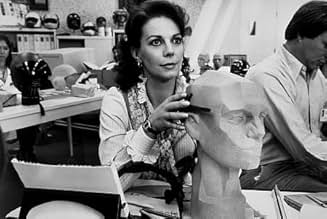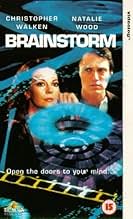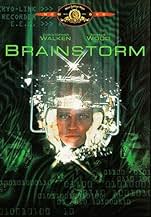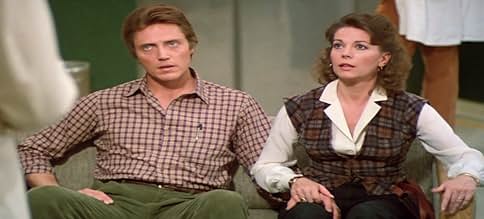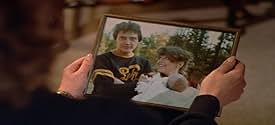शोधकर्ताओं ने एक प्रणाली का विकास किया है जहाँ वे लोगों के दिमाग को जान सकते हैं. लेकिन जब शामिल लोग अपनी व्यक्तिगत समस्याओं को इस समीकरण में प्रस्तुत करते हैं, तो ये खतरनाक हो जाता है - शाय... सभी पढ़ेंशोधकर्ताओं ने एक प्रणाली का विकास किया है जहाँ वे लोगों के दिमाग को जान सकते हैं. लेकिन जब शामिल लोग अपनी व्यक्तिगत समस्याओं को इस समीकरण में प्रस्तुत करते हैं, तो ये खतरनाक हो जाता है - शायद प्राणघाती.शोधकर्ताओं ने एक प्रणाली का विकास किया है जहाँ वे लोगों के दिमाग को जान सकते हैं. लेकिन जब शामिल लोग अपनी व्यक्तिगत समस्याओं को इस समीकरण में प्रस्तुत करते हैं, तो ये खतरनाक हो जाता है - शायद प्राणघाती.
- निर्देशक
- लेखक
- स्टार
- पुरस्कार
- 2 जीत और कुल 6 नामांकन
- Barry
- (as David Wood)
- Realtor
- (as Mary-Fran Lyman)
फ़ीचर्ड समीक्षाएं
So you could call "Brainstorm" a bit of a disappointment but by doing so you are not doing the movie enough justice and you are not giving it the credit it still deserves. I really still liked it, despite all of its flaws, though some of those flaws can also be brought back to the difficulties of production at the time.
Biggest 'inconvinience' for this movie of course was the sudden and tragic death of key actress Natalie Wood. It almost caused this movie to be stopped down completely but with some changes and rewrites the movie still got finished and released, just not in the way it originally got intended. It must be the reason why the movie ends so abruptly and the story leaves far more questions than answers.
The movie does really have a great concept of the invention of a device that can recored people's experiences and feelings and that can be played back by a different person that will feel the exact same feelings, smells and tastes. A sort of virtual reality, with the exception of that there is actually nothing virtual about the reality. The possibilities with this device are endless and sort of a shame that now almost 30 years later we don't have anything remotely close yet. I said that the possibilities are endless, yet the movie is doing far too little with it. It deliberately restrains itself it seems.
The movie just never reaches full potential, though it is obvious that somewhere deep down everything there is still a great movie to be found. But it remains a fact that the movie never reaches its full potential with its story. The story fails to intrigue and also fails with other things, such as its tension. Quite frankly I had no idea what was all happening toward the end and what the big 'conflict' that needed to be resolved was and how it got done exactly. There is a 'villainoush' plot in the movie that just never seemed that evil- or got explained good enough.
The movie got directed by special effect expert Douglas Trumbull. So visually this movie really doesn't disappoint and to be frank I think that it are still mostly the visuals and its effects that safe this movie and still make it a more than good watch.
But you also have to give credit to Christopher Walken of course, who basically never fails to put down a great performance and character. I really liked most of the acting in this movie and it seemed to be a very well cast one, with some truly great characters in it, that all interact really great and convincingly together.
The movie also features an early James Horner musical score. Funny thing about Horner musical scores is that basically it doesn't matter if it's anything from the '80's, 90's, 2000's or this decade, the all have the same sound and feature the same motifs. It's not big secret Horner often recycles his most early scores and the score of this movie also got heavily recycled by himself in many later movies. Still I'm sure his fans can appreciate his score for this movie and I'm also really not hateful toward it.
Really not as great as this movie potentially could and perhaps also should had been but nevertheless it remains still a good 'realistic' science-fiction movie to watch.
7/10
http://bobafett1138.blogspot.com/
Yes, "Brainstorm" is marred by uneven acting and the death of its lead actress, Natalie Wood, under circumstances that to this day are still the stuff of speculation.
Yes, Louise Fletcher's death scene is overacted to the point of parody.
Yes, it's not easy to accept Christoper Walken in a role of a semi-normal person.
Yes, "Brainstorm" was only Douglas Trumbull's second film as a director, and some might argue that it was little better than "Silent Running."
But, even despite all of that, the story is incredibly engaging, the visuals are striking (what else would you expect from the wizard responsible for "2001" and "Blade Runner"?), James Horner's music is absolutely divine, and the film is quite enjoyable.
Also, in its favor, a great deal of the credit (or blame, as many would say) for the final result lies squarely with MGM/UA. Still dealing with United Artists' financial baggage after their merger, the company all but took the film away from Trumbull after Wood's death--not to mention the studio's lack of support for Trumbull's plan to film the "helmet" sequences in his ultra-realistic Showscan process.
So, in point, I highly recommend this movie, but just be aware of what you're getting into...
Christopher Walken and Louise Fletcher star as Michael Brace and Lillian Reynolds, two old- fashioned mad scientists working to perfect a virtual reality device that records human experiences. It can allow you to taste what somebody else is eating, for example, or feel what it was like for them as they rode a roller coaster. The people funding and backing Brace & Reynolds ultimately don't like the way they do things, and try to alter the course of the research. Michael becomes obsessed with checking out a tape made by Lillian, and figures out a way to sneak past the defenses of the computer program running the show.
Overall, this is an amusing show, with solid acting by all concerned. Fletcher is indeed a standout. "Brainstorm" is notable for being the last credit for co-star Natalie Wood (who isn't given very much to do), whose untimely death occurred during production. Supporting cast members include Cliff Robertson, a likable Joe Dorsey ("Grizzly"), and a young Jason Lively ("Night of the Creeps") as Walken and Woods' son. (Walkens' real-life spouse Georgianne, who usually works as a casting director, appears on screen here as Dorseys' wife.) The technical work on the film is of course first rate, with eye popping visual effects, effective production design, and a thunderous music score by James Horner.
Worth a look for fans of this genre.
Seven out of 10.
Most sci-fi films based on technology don't age well, and there are times where this is no exception. The idea of recording on tape, let alone making tape loops, must seem like wax cylinder recordings to today's MP3 generation. The tapes themselves were props borrowed from a film being shot nearby, and that film was itself a dismal failure. But the concept is timeless, and so well done that, all in all, the film still works as well as it did in 1983.
Lesser screenplays would have been content with the main story line; scientists invent a way to record brainwaves and play them back for a real life out of body experience, and for just such a stinker, check out Strange Days. But then along comes the incomparable, utterly fabulous Louise Fletcher, who, as one of the co-inventors of the aforementioned device, records her death when she suffers a heart attack while working late one night. For the rest of the film, people are either trying to play the tape or prevent others from playing it. Meanwhile, the technology gets hijacked by two-dimensional government lackeys trying to exploit the weapons potential of the invention.
One can easily pick out scenes of this movie to vilify or exalt, all these years later, and any object viewed over time eventually has a vanishing point. The almost slapstick scene where the assembly robots go berserk is one example of a scene that, while consistent with its contemporaries, is silly today. The death scene, though much maligned, is equally misunderstood, and provides the metaphysical underpinnings that elevate Brainstorm above mere gadget flicks. Brainstorm is about exploring experience, life, love, even death, from the point of view of others, and Academy Award winner Louise Fletcher allows us to do so through her consummate skill in presenting a death scene of sufficient awe and wonder to warrant exploration.
If you want to find out what else happens, watch the film, but when you do, don't ignore the beautiful, delicate interplay between Christopher Walken and Natalie Wood. Their careening relationship seems somehow tied to the invention they helped make, and there are sequences so beautiful that I sometimes take out the DVD just to marvel at them.
Despite changing styles in special effects, this is a timeless and beautiful story that transcends the genre and, with Walken, Wood and Fletcher, becomes more than just a story about shiny gold tapes that record brain waves. It's more about immovable objects and irresistible forces and what happens when they collide. Intrigued? Good. Go watch it.
The "recorded memory" sequences were even more vivid for us in Indianapolis who saw it at the Eastwood theatre. The Eastwood had one of the few curved Cinerama roadshow screens outside of New York and Hollywood's Cinerama Dome. Think of it as a smaller version of an Omnimax screen. Sitting in the front row, you were completely enveloped by the film, and the visual and audio effect when the "memory" sequences lit up were quite attention grabbing. Trumbull was at this time working on his ill-fated Showscan process for amusement park rides, and was very interested in audience perceptions of diffrent lenses and frame rates. Some of this is used in Brainstorm. It's just not the same on a TV set of any size.
The central core of the story - the recording of the death of Lillian and Michael's obsession to experience it - is a disturbing one, because it explores the very nature of life and death. It can satisfy or dissappoint, because Trumbull has put his vision of memory, experience, death and afterlife on film for everyone to take pot shots at. And they did. It's a shame, because the film is beautiful, thought provoking, and ingenious. Yeah, I know, it has all of that evil government plot boilerplate. Look past it.
(It even revels in the quirks of the researchers, showing the second thing everybody does with new technology is use it for porn.)
क्या आपको पता है
- ट्रिवियाBecause of the immensely troubled production and disagreements with MGM, Douglas Trumbull opted never to direct a Hollywood film again. In 1983 he stated, "I have no interest . . . in doing another Hollywood feature film . . . Absolutely none. The movie business is so totally screwed-up that I just don't have the energy to invest three or four years in a feature film. Moviemaking is like waging war. It destroys your personal life, too. The people who can survive the process of making films have largely given up their personal lives in order to do that, just because it's such a battle to make a movie. And in doing that, they've isolated themselves from the very audience that they're trying to reach."
- गूफ़Several of the tapes play back from a third-person perspective, which would be impossible if the tapes were actually a person's recorded memory.
- भाव
Dr. Michael Anthony Brace: I made that for you. It's a gift.
[hands her the tape and sets the large silver metal case on the bed]
Karen Brace: What is it?
Dr. Michael Anthony Brace: It's me.
- क्रेज़ी क्रेडिटAfter the final credit has rolled, 'TO NATALIE' appears for a couple seconds
- इसके अलावा अन्य वर्जनIn the psychotic episode sequence when Michael's (Christopher Walken) son Chris (Jason Lively) wears the headset, there's a slight difference between the 70mm version and 35mm version. In the 70mm version of Chris's hallucination when Michael flips a lever presumably sending an electrical current to Chris's head, the camera cuts to and remains on a shot of a circular device with electricity running through it, as Michael is heard to say, 'Now you're gonna find out it's mine!' In the 35mm version, the shot arrangement is the same except that it cuts back to a closeup of Michael saying the line 'Now you're gonna find out it's mine!'
- कनेक्शनEdited into Trumbull Land (2018)
टॉप पसंद
विवरण
- रिलीज़ की तारीख़
- कंट्री ऑफ़ ओरिजिन
- भाषा
- इस रूप में भी जाना जाता है
- Proyecto Brainstorm
- फ़िल्माने की जगहें
- Research Triangle Park, नॉर्थ कैरोलीना, संयुक्त राज्य अमेरिका(Burroughs Wellcome Pharmaceutical Corporation HQ)
- उत्पादन कंपनियां
- IMDbPro पर और कंपनी क्रेडिट देखें
बॉक्स ऑफ़िस
- बजट
- $1,50,00,000(अनुमानित)
- US और कनाडा में सकल
- $1,02,19,460
- US और कनाडा में पहले सप्ताह में कुल कमाई
- $11,96,965
- 2 अक्तू॰ 1983
- दुनिया भर में सकल
- $1,02,19,460
- चलने की अवधि1 घंटा 46 मिनट
- रंग
इस पेज में योगदान दें




